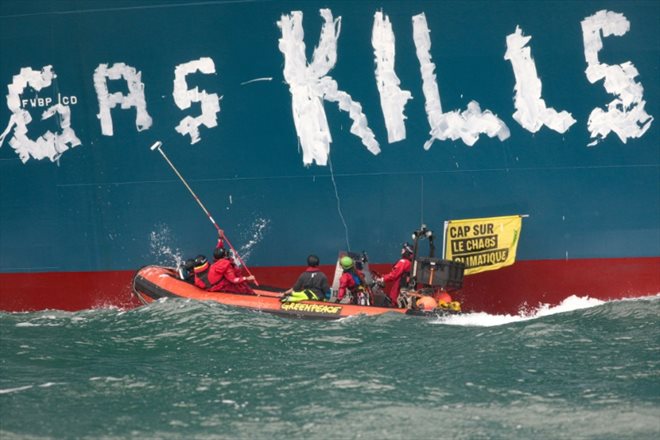Greenpeace France activists unfurl a banner near the TotalEnergies Cape Ann LNG tanker which is preparing to enter the port of Le Havre, September 18, 2023 (AFP/Lou Benoist)
Greenpeace activists tried in vain on Monday morning to prevent the installation of a floating LNG terminal in Le Havre, a project led by the oil and gas group TotalEnergies and wanted by the government to secure the country’s gas supply. noted AFP.
Three Greenpeace semi-rigid boats joined the Cape Ann LNG tanker in the Bay of Seine. Having failed to board, activists then painted “gas kills” on its hull in large white letters, observed an AFP journalist.
Then, in the harbor of Le Havre, two divers went into the water to hinder the progress of the LNG tanker, which entered the port shortly before 12:00 p.m.
“TotalEnergies fully respects the right to demonstrate and freedom of expression,” commented the group’s management to AFP. “However, the safety of people, particularly sailors and militants, is our priority, as is the security of our operations,” she added.
For the government, this project aims to create a new entry point for liquefied natural gas (LNG) in France to strengthen the security of gas supply, which had suffered severe tensions in 2022 after the outbreak of the war in Ukraine .
France already has four LNG entry points: one in Dunkirk (North), another Montoir-de-Bretagne (Loire-Atlantique) and the last two in Fos-sur-Mer (Bouches-du-Rhône).
This gas, transported in liquid state by boat and regasified before being injected into the land network, has become a crucial energy source for Europe, which depended 40% on Russian gas before the conflict in Ukraine.
The TotalEnergies project in Le Havre was authorized in July 2022 for a period of 5 years, “as a precautionary measure”, according to the Ministry of Energy Transition.
Cape Ann has a capacity of 5 billion cubic meters per year, the equivalent of 10% of French demand.
For the ministry, this is not enough. “The government’s responsibility is to anticipate all possible scenarios in order to meet the needs of the French in all circumstances: a very long and cold winter for example, a lack of supply or even a breakdown in existing infrastructure, which could lead to difficulties,” he told AFP.

Greenpeace activists paint the words “gas kills” on the hull of the Cape Ann LNG tanker off the coast of Le Havre on September 18, 2023 (AFP/LOU BENOIST)
On the other hand, Jérôme Frignet, Greenpeace program director, asks that “this terminal not be connected to the network”: “We do not need these new capacities”, he tells AFP.
“Since Russia’s invasion of Ukraine, France has managed to reduce its gas consumption by 15%, and we see that in 2023 the trend is also towards reduction (…) and we have already “full stocks for winter”, he argued during the action in Le Havre.
Mr. Frignet also denounces a “hypocrisy” in this terminal, which will be “mainly supplied by the United States and in particular by shale gas produced by hydraulic fracturing, a technique banned in France.”
Several elected officials and environmental organizations had challenged the arrival of the LNG terminal in court, believing, like Greenpeace, that it maintained dependence on fossil fuels responsible for global warming. All their appeals were rejected.
© 2023 AFP
Did you like this article ? Share it with your friends using the buttons below.




